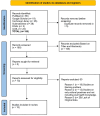Oral health knowledge, perceptions and attitudes of pregnant women in Sub-Saharan Africa: a systematic review
- PMID: 40481470
- PMCID: PMC12144732
- DOI: 10.1186/s12903-025-06249-y
Oral health knowledge, perceptions and attitudes of pregnant women in Sub-Saharan Africa: a systematic review
Abstract
Background: This systematic review aimed to assess pregnant women's knowledge, perceptions, and attitudes toward oral health changes in sub-Saharan Africa (SSA) and examine their oral health-seeking behavior during pregnancy.
Methods: A comprehensive search was conducted across PubMed, Google Scholar, African Journals Online (AJOL), the Directory of Open Access Journals (DOAJ), and the Cochrane Library. Both Medical Subject Headings (MeSH) and free-text terms related to oral health, knowledge, attitudes, perceptions, antenatal care, pregnancy, and Africa were used. Boolean operators ("AND," "NOT," and "OR") refined the search strategy. Two independent reviewers screened studies and extracted data using Rayyan software, with a third reviewer resolving conflicts. The Robins-E tool assessed the risk of bias.
Results: Fifteen of seventy-five studies initially identified met the inclusion criteria after full-text screening. Most employed a cross-sectional design. Findings revealed low oral health-seeking behavior among pregnant women in Africa, attributed to factors such as negative dental experiences, concerns about harm to the unborn child, and the belief that dental care is unnecessary. Many women visited dental clinics only when they noticed significant oral health changes.
Conclusions: The reviewed studies demonstrated a low risk of bias and consistent findings. Pregnancy is a critical period, and poor oral health can adversely affect birth outcomes. Insufficient knowledge and misconceptions deter women from seeking dental care during pregnancy. To address this, targeted oral health education must improve awareness and overcome barriers to seeking care.
Keywords: Africa; Attitude; Knowledge; Oral health; Perception; Pregnancy; Women.
© 2025. The Author(s).
Conflict of interest statement
Declarations. Ethical approval: Not applicable. Consent for publication: Not applicable. Competing interests: The authors declare no competing interests.
Figures
Similar articles
-
Folic acid supplementation and malaria susceptibility and severity among people taking antifolate antimalarial drugs in endemic areas.Cochrane Database Syst Rev. 2022 Feb 1;2(2022):CD014217. doi: 10.1002/14651858.CD014217. Cochrane Database Syst Rev. 2022. PMID: 36321557 Free PMC article.
-
Maternal perceptions of the quality of Care in the Free Maternal Care Policy in sub-Sahara Africa: a systematic scoping review.BMC Health Serv Res. 2020 Oct 1;20(1):911. doi: 10.1186/s12913-020-05755-9. BMC Health Serv Res. 2020. PMID: 33004029 Free PMC article.
-
Provision and uptake of routine antenatal services: a qualitative evidence synthesis.Cochrane Database Syst Rev. 2019 Jun 12;6(6):CD012392. doi: 10.1002/14651858.CD012392.pub2. Cochrane Database Syst Rev. 2019. PMID: 31194903 Free PMC article.
-
Exploring measurement tools used to assess knowledge, attitudes, and perceptions of pregnant women toward prenatal screening: A systematic review.Womens Health (Lond). 2024 Jan-Dec;20:17455057241273557. doi: 10.1177/17455057241273557. Womens Health (Lond). 2024. PMID: 39206551 Free PMC article.
-
Obstetric, foetal and neonatal outcomes in adolescent pregnancy in sub-Saharan Africa: Systematic review and meta-analysis protocol.PLoS One. 2025 May 9;20(5):e0323099. doi: 10.1371/journal.pone.0323099. eCollection 2025. PLoS One. 2025. PMID: 40344007 Free PMC article.
References
-
- Saadaoui M, Singh P, Al Khodor S. Oral Microbiome and pregnancy: A bidirectional relationship. J Reprod Immunol. 2021;145:103293. - PubMed
-
- Sanjana Vijay Nemade KJS. (2015) Pyogenic granuloma. In: Granulomatous Dis. Otorhinolaryngol. Head Neck. p 2368.
Publication types
MeSH terms
LinkOut - more resources
Full Text Sources
Medical
Research Materials
Miscellaneous



